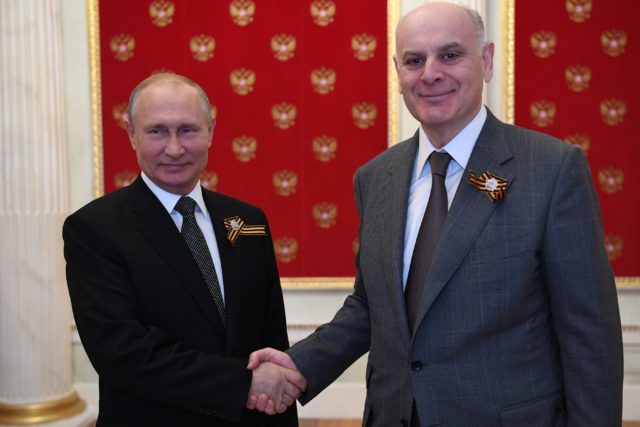
Abkhazia Highlights Challenges Moscow Faces in Integrating Belarus
Publication: Eurasia Daily Monitor Volume: 17 Issue: 141
By:

The political difficulties and expenses Moscow will face if it seeks to more fully integrate Belarus (see EDM, September 10) are patently visible in the problems—albeit on a smaller scale—the Russian government has had over the past decade in its efforts regarding Abkhazia and South Ossetia. Moscow secured the “independence” of these two breakaway republics in 2008, as a result of its military actions against Georgia. But attempts to de facto absorb these regions have proven far more taxing than the Kremlin suggested they would be. And at a time of economic stringency in the Russian Federation, many in Moscow can see that paying for President Vladimir Putin’s plans vis-à-vis Belarus would, likewise, be extremely expensive and further limit the Russian government’s ability to help its own population.
On September 30, the Russian Duma (lower chamber of parliament) posted on its website the draft federal budget for 2021 and its planning numbers for 2022 and 2023 (Duma.gov.ru, September 30). With regard to assistance for Abkhazia and South Ossetia, the figures reflected Deputy Prime Minister Dmitry Kozak’s order earlier that month to raise the salaries of budget workers in both of the Moscow-backed statelets, a step that is projected to cost 1.25 billion rubles ($20 million) in 2021 and 1.17 billion rubles ($18 million) in 2022 and 2023 (RBC, October 4). Those are trivial amounts, and even the total Russian assistance package for the two separatist Georgian regions is relatively small. Next year, the draft budget calls for providing Abkhazia and South Ossetia with 13.76 billion rubles ($200 million). At present, the Russian government provides 90 percent of the state budget in South Ossetia and 50 percent of that in Abkhazia, but the combined population of the two territories is under 300,000 (245,000 for Abkhazia and 53,500 for South Ossetia (Sobkorr.org, October 5).
The population of Belarus, on the other hand, is at least 30 times larger. And while Minsk might not need subsidies 30 times as great, its population could well demand that much—and the resulting figures would be enormous. Moreover, as the experience with Abkhazia and South Ossetia shows, such demands might extend for years and increase rather than decline over time. Even the comparably small financial burden of the two breakaway Georgian republics is already leading to discussions about what Moscow would have to do there to ensure that they remain stable and tied to Russia. Those discussions, by extension, call attention to the much greater potential challenge Belarus presents.
Ukrainian journalist Natalya Ishchenko intimates that these costs are a problem even in Abkhazia and South Ossetia, and yet many in Moscow hope to press ahead anyway (Dsnews.ua, September 27). While South Ossetia has been slavishly obedient to Moscow and has a leadership committed to becoming part of the Russian Federation, Abkhazia has proven less so. The latter’s separatist regime generally seems to want to retain formal independence (see EDM, June 15).
The Russian government has not officially declared its intention to absorb either statelet; but in the last month, many close to the regime, including Liberal Democratic Party (LDPR) leader Vladimir Zhirinovsky, Eurasianist ideologue Aleksandr Prokhanov and nationalist activist Zakhar Prilepin, have been pushing for their final incorporation, Ishchenko reports. They are Russian territories, the three assert, and must be part of the Russian Federation. What is striking, she continues, is that the Abkhazian government has denounced such calls, declaring that “the political status of the Republic of Abkhazia [sic] is not subject to review and has an irreversible character.” That is, Abkhazia wants good relations with and money from Moscow, but it does not wish to be part of the Russian Federation (Dsnews.ua, September 27).
To overcome this intransigence, Moscow is apparently now being forced to send more money to these small quasi-states while it works to assume control of their key industries, which will allow Russia to integrate these territories in all but name. Over time, this strategy may work with South Ossetia; though it is a less foregone conclusion in Abkhazia. The response of the Abkhaz to Russia’s current push shows that Moscow will have to spend a lot more money for a lot longer and engage in more “hybrid” integration activities if it hopes to integrate that region into the Russian state.
Putin has infamously described the disintegration of the Soviet Union in 1991 as “the greatest geopolitical disaster” of the 20th century and talked about reversing it by reintegrating much of the former Soviet territory under Moscow’s rule. His desire to do so is based on two assumptions, neither of which is true and both of which are likely to further diverge from reality as time passes. First, he acts as if the people in neighboring non-Russian countries and regions share his view when they, in fact, are becoming ever more committed to independence. Reactions like those in Abkhazia and the protests in Belarus show how wrong Putin is on the first point. Second, he assumes that hard-pressed Russians are prepared to spend money on others instead of themselves to make this happen. But new polls show that ever fewer Russians are prepared to make that sacrifice or pay the price of empire. They want Moscow to spend money on their needs (Rosbalt.ru, September 21; see EDM, October 6).
Thus, what the Kremlin appears to be driven to do in a small way in Abkhazia and South Ossetia will only underscore for Russians why their country will face serious and expensive problems if it tries to do the same in Belarus. Up to now, much of the discussion about the future of Belarus has been about Putin’s intensions; far more deserves to be devoted to his ability to achieve them. It may be that his own population is not willing to pay the costs that would be needed to overcome Belarusian opposition. The Abkhazian experience certainly suggests this is likely.



